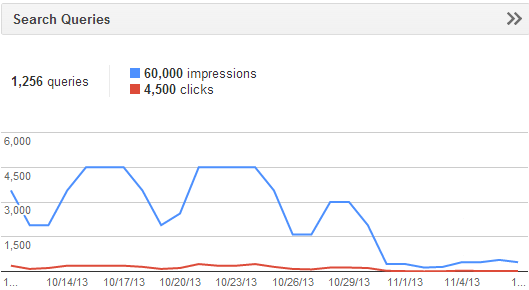If you run a website, you may have noticed a, well, slight drop in numbers recently. I did, and not sure why, though. WTF, Google?
Search Engine Optimization (SEO) doesn’t really affect hobby sites, rather, it can greatly affect a for-profit site. Not paying attention the factors that control your company’s placement in a search engines results *can* cost your company money.
On October 4, Google deployed a new version of their Penguin algorithm, v 2.1.
Initially, I thought, “No big deal”. I run a square house, and I try not to break any rules by accident. Any optimizations that are undertaken are mainly for actual site performance (read: speed this site up), and not really in SEO.
So, this morning I was reviewing the Google Webmaster Analytics, checking out the weeks traffic, etc., and I noticed a pattern. Hmmm, traffic seems to be dropping. Sure enough, expanding the date range of the chart, out to 3 months show a drop of about 40% over the previous three months.
Something happened on or about October 26th. Time to investigate further. I crack open Google Webmaster tools, and sure enough, on October 24th I see a marked decrease in the number of times the site turns up in Google search results:

As you can see by this chart, directly from Webmaster tools, this site has a cycle of around 4500 appearances on weekdays, and drops on weekends to around 2000. No big deal, since this has been the pattern as long as the site has been in existence. Being target towards technology professionals, who mainly work Monday through Friday, this is expected.
Notice the nose dive, though. From October 31 to November 9, there have been between 300 and 500 appearance in search results. OUCH! Looks like the Penguin has not just bit my butt, it has also pooped on my pillow.
I’ve done a bit of quick research (I need to read some more), but here is what seems to be the top reasons that this could happen.
Spammy or Low quality non-relevant links
This happens mainly if you pay some guy or “company” to put your link out there on random sites. For example, this is a tech related site, and if my links show up on random food blogs with anchor text of “Big Mac Recipe”, that’s non-relevant. Make sure that links and anchor text to your content are relevant to the subject being discussed. If it’s not, ask for the link to be removed, or use the disavow tool.
Hmmm, nope. Looks like all my links are relevant.
Paid links that are not mentioned as nofollow
Stay away from dofollow links on random directories, blog rolls, site wide footer links, and the like. For example, if you have some site out there with 50,000 pages, and all 50,000 pages have your link at the bottom, without a nofollow tag, that’s spam. Get rid of it.
This might be part of my problem. There is a site out there that has dropped my link in the footer. Need to check that out and get it fixed!
Spammy or black hat SEO techniques
This is generally thought of as simply following unethical practices for gaming search engines. If you present different content to search engines than end users, that’s an example black hat SEO. Don’t do it; you’ll get caught.
Nope. I don’t engage in black hat activities.
Article syndication links
Do you publish articles ? Do you have guest authors that publish articles on your site ? Get rid of those links that are embedded in the article. Also, you should already be checking for duplicate content. Don’t allow it. Ever.
Not that. I check for this stuff constantly. All guest posts are reviewed before being made public, and are checked periodically afterward.
Forum or blog posting abuse
This could be things such as planting links within forum signatures, or creating really low quality blog posts on 3rd party sites, like Blogger, for the sole sake of acquiring backlinks.
Might have to review this one, too. I have a couple of forums that I frequent, which are tech related, in which the site appears in my signature. Buh-bye, signature links!
Large number of exact match keywords used within external links
This kind of falls in the spammy links category. If you are making a post on some forum about a particular subject, and the anchor text exactly matches the content that you are linking to, this might get you.
Great, now I’ve got not reference my particular key words?
Large number of backlinks coming from one website
Usually referred to as site wide links, this can be spammy, too. See the mention above about Paid Links.
Looks like I have a few things to check.
I can totally appreciate Google wanting to keep its search results clean and relevant to whatever the searcher is searching for, and I thank them for that. But in doing so, I feel like there are some sites with relevant and useful content that are going to be missed due to the fact they are trying to get the word out about their site.
As for myself, I’ll clean up the few points that might be hindering search result appearance frequency, but I think I am going to step up my efforts in optimizing for other search engines as well.
